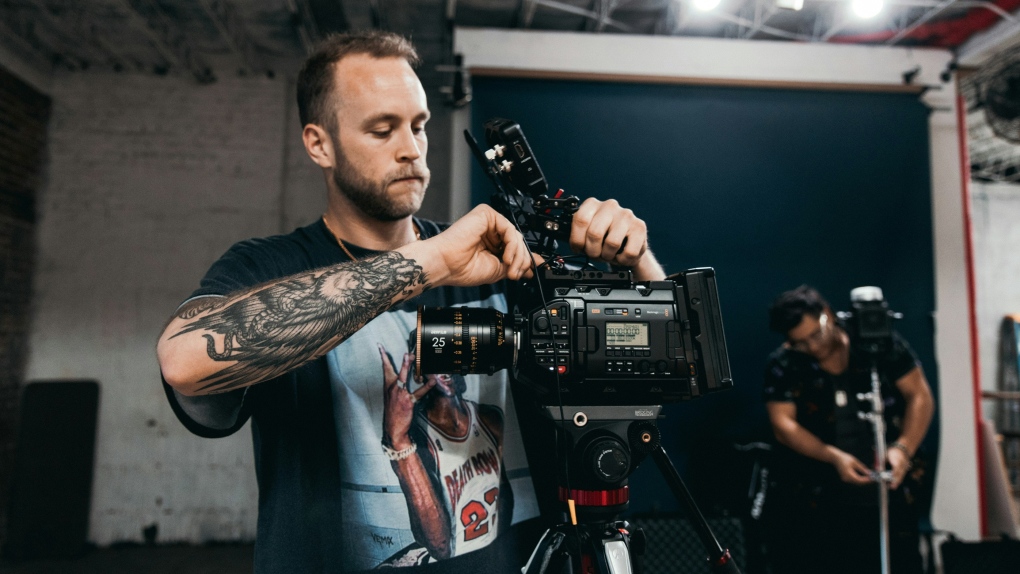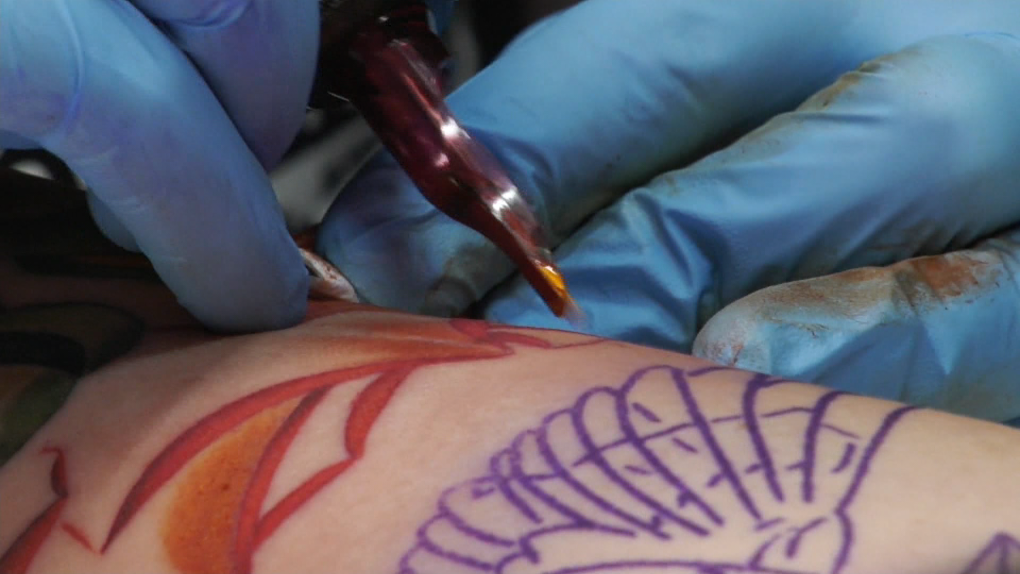Tattoos in the workplace, how has society's perception of ink changed?
 Stock image of a person getting a tattoo. (Pexels)
Stock image of a person getting a tattoo. (Pexels)
The old saying is 'Don't judge a book by its cover,' and the same should apply to people too, but how true is that?
People have biases and those can affect the decisions we make about others, including in the workplace.
Judgements can be made because of how people act, what their work ethic is and what they look like, including if they have tattoos or not.
In the recent past, tattoos were seen as part of rebel and anti-establishment culture, even criminal culture.
"In Canada, we come from the British tradition, which is quite structured and conservative in the way it changes," Dr. Ganz Ferrance, a registered psychologist, said. "There are certain things that were looked on as not proper or not part of the regular establishment,"
Famously, the Yakuza, the Japanese mafia, is known for elaborate and extensive tattoos. This stems from a tradition of tattooing criminals based on their crime as a form of punishment and identification.
Tattooing also has a rich history throughout many cultures, including Polynesians, Nubians and Greeks. Tattoos would be used to show accomplishments, protect from evil and show status or beliefs.
There is evidence tracing the practice of tattooing as far back as 3,000 BC, according to Jennifer Flanagan, an associate professor at the Texas Women's University and Vance Johnson Lewis, a professor at Oklahoma City University, in the 2018 study 'Marked inside and out: an exploration of perceived stigma of the tattooed in the workplace.'
Tattoos in today's world
Nowadays, tattoos are more common, with 31 per cent of Canadians having at least one tattoo and 28 per cent having five or more, according to a 2024 survey by Narrative Research.
"It's seen as more of a personal expression, just like how we cut our hair or the type of makeup or clothes we wear," Ferrance said.
Due to older, negative views on tattoos, they used to be uncommon in the workplace, especially in white-collar fields.
"There is no guarantee … that the individuals with whom one comes in contact during their daily work or personal activities will embrace the expressions of individuality which tattoos represent," Flanagan and Lewis wrote.
"For organizations, a conflict arises when attempting to balance the needs of diversity, the expressions of individuals within the organization and the perceptions of customers/constituents of the organization, particularly where tattoos are concerned."
The perception of tattoos can vary depending on the industry, with the ink being a boon in some fields.
"In a graphic artist’s studio, a tattoo, even a bold one, might spark the edgy image a potential customer appreciates in an artist, leading a client to feel they discovered the perfect talent," Enrica Ruggs, an associate professor at the University of Houston, wrote in the 2022 study 'Do employees' tattoos leave a mark on customers' reactions to products and organizations?'
"In other situations, that’s not so true. In medical settings, particularly, tattoos may be seen as unwelcome.
"Maybe patients find them inappropriate on certain professionals or perhaps mistaken beliefs still linger about tattoo studios and cleanliness."
Skills over perception
As tattoos become more common however, "you don't even notice them anymore," according to Cal Jungwirth, the director of permanent placement services with the Robert Half recruitment agency.
"Social norms have evolved, and social norms continue to evolve, so it's not really an issue anymore," Jungwirth said.
"What we more coach on is just presenting oneself professionally and a lot of that is just being in suitable professional attire.
"We encourage organizations to, obviously, hire based on the right skill, based on the right fit for the organization, and if someone has a tattoo, it's kind of beside the point."
 Stock image of a man with tattoos. (Unsplash)
Stock image of a man with tattoos. (Unsplash)
Getting a tattoo is also not an easy process, between deciding what to get, finding the right artist and the pain of getting it inked, just having one can show a high level of commitment.
"If I have a tattoo … but I still show up and I can present myself as knowledgeable and as respectful and as whatever that the situation requires, that's going to start to change perceptions," Ferrance said.
As attitudes worldwide change towards tattoos, workplaces need to become accepting of them in order to survive, because if something doesn't adapt to a changing environment, it dies, according to Ferrance.
"Even if you've been used to seeing people with tattoos as different or somehow counter cultural, being open to the fact that we don't know everything … and maybe I can learn something from the person with the tattoo," Ferrance said.
"Just being open to that is healthy for the person who has had the sort of strict view of life. It helps them open up and helps them to grow and then make space for everybody."
As the older generations age out of the workplace, the people who fill those roles tend to have a more open mindset to how people express themselves, added Ferrance.
The mental aspect of tattoos
When people have to hold themselves back from their self-expression, it can be draining and lead to stress.
People who use tattoos as a form of self-expression and work in a place that discourages or discriminates against tattoos need to be sure the added stress is worth it.
"There is a balance, just like anything else. Every choice we make, there's a cost and there's a benefit," Ferrance said. "If there is a sense of, 'I'm holding myself back,' and it's quite stressful … the question becomes, is this the right workplace for me?"

"Do I need to look for a place where I can truly be relaxed and be myself, and then I can enjoy my job a lot more and probably go further in it, because I'm actually unfettered now," Ferrance added.
"Or is it, 'No, I really like this job,' and I'm willing to, in a sense, play the game for a while, while I get what I need from the job and then be able to express myself in some other way."
As society gets used to seeing things, like tattoos, they become normal, but that often leads to other groups being labeled as different or outcasts.
"One thing I would encourage us all to do, is remember that it used to be us, so let's not pass the buck on to these other guys just because the pressure's off us, just because we're being accepted," Ferrance said. "Don't now turn around and not accept these other folks.
"We should think about how that felt to us, and what the people who came before us had to deal with to be able to create that acceptance for us. Let's help these new folks that are in the hot seat now."
At the end of the day, tattoos are for you, the person with them, and no one else.
CTVNews.ca Top Stories

DEVELOPING Two-month GST holiday bill expected to pass the House today, Conservatives to vote against
The federal government's five-page piece of legislation to enact Prime Minister Justin Trudeau's promised two-month tax break on a range of consumer goods over the holidays, is expected to pass in the House of Commons by the end of the day.
Canada Post temporarily laying off striking workers, union says
The union representing Canada Post workers says the Crown corporation has been laying striking employees off as the labour action by more than 55,000 workers approaches the two-week mark.
B.C. man lied about cancer diagnosis while dodging $330K debt, court hears
A construction contractor from B.C.’s Lower Mainland has been ordered to repay a $330,000 loan from a friend who gave him leeway for years, despite her own financial suffering – all because she was under the false impression he had brain cancer.
Good Samaritan killed in tragic accident while helping stranded Calgary driver
Calgary police say a Good Samaritan who stopped to help another motorist was killed in an accident on Wednesday night.
Man jumps out of moving roller-coaster after safety belt fails
Terrifying video shows a man jumping out of a moving roller-coaster in Arizona after he says his safety belt failed.
Listeria contamination concerns prompt mushroom recall: Health Canada
Health Canada says customers across Ontario and Quebec should throw out or return any O’Ya hoho brand Enoki mushrooms due to listeria concerns.
W5 Investigates 'Let me rot in Canada,' pleads Canadian ISIS suspect from secret Syrian prison
W5's Avery Haines tells the story of Jack Letts, a Canadian Muslim convert in a Syrian jail, accused of being a member of ISIS. In part two of a three-part investigation, Haines speaks with Letts, who issues a plea to return to Canada to face justice.
Canadian woman shares methanol poisoning story in wake of death investigation in Laos hostel
Cuddling on the couch with her dog, Ducky, no one would notice that anything is different about Ashley King. Even when she walks across the living room, she doesn’t miss a step. But the 32-year-old has gotten used to functioning with only two per cent vision.
Carrot recall for E. coli risks updated with additional product, correction: CFIA
The Canadian Food Inspection Agency (CFIA) has published an update to a recent national recall on organic carrot brands over E. coli contamination risks.
































